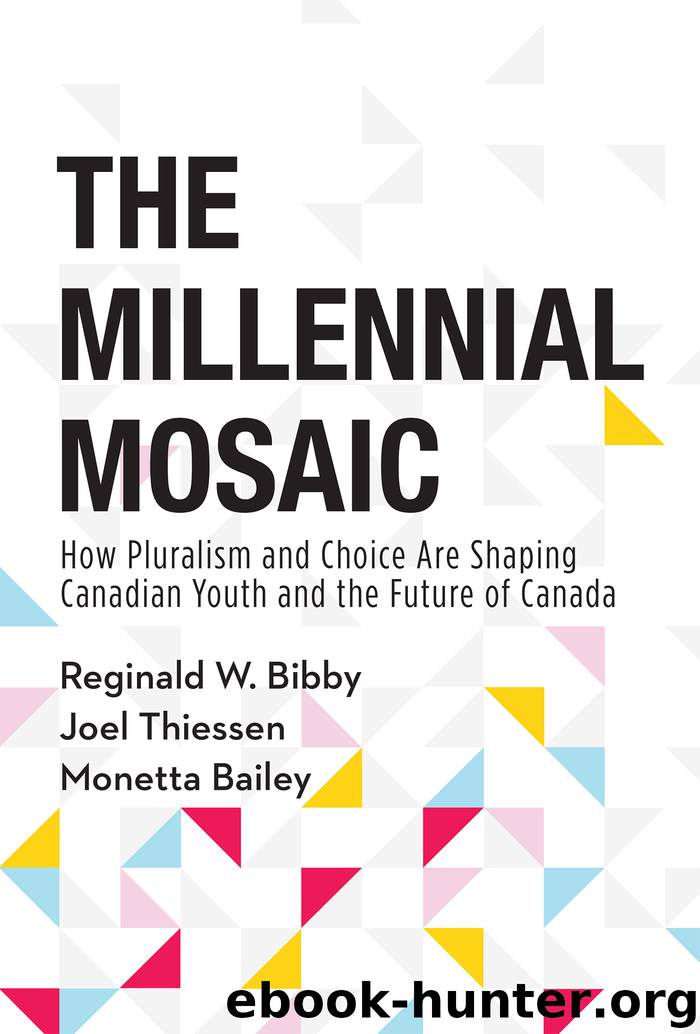The Millennial Mosaic by Reginald W. Bibby

Author:Reginald W. Bibby
Language: eng
Format: epub
Publisher: Dundurn
Published: 2019-07-12T16:00:00+00:00
American psychologist Carl Pickhardt has noted the paradox of young people simultaneously courting parental approval and disapproval. He distinguishes between parental approval and love: “Approval is awarded. Approval is earned. Love, on the other hand, is constantly anchored in parental commitment. It never varies. Approval is conditional upon performance; love is unconditionally given.”30 Following his thinking, young Canadian women — generally speaking — seem to feel a greater need than their male counterparts to please their parents. Conversely, males — in keeping with widely documented evidence31 — continue to place a higher value than females on aggressiveness, independence, and the overt expression of their feelings.32 Whatever the precise reasons, the gender differences in the importance of parental approval continue to exist.
Interracial Marriage
We already saw in Chapter 4 that Millennials are leading the way in approving of same-sex marriages and same-sex parenting. This acceptance, we noted, is another example of the enshrinement and pervasiveness of a pluralistic Canadian mindset that places supreme value on diversity and choice.
In addition to growing acceptance of our LGBTQ population, Canadians have experienced profound changes in outlook when it comes to interracial marriage.
It’s hard to believe that in the mid-1970s, more than 40 percent of Canadians did not approve of marriages involving white people and either black people or East Indians/Pakistanis (see Figure 5.6). Similarly, some 35 percent disapproved of white–Asian marriages, and 25 percent of white and Indigenous people marrying.
Today Millennials lead the way in almost unanimously stating their approval of all forms of racially or culturally mixed unions (see Table 5.5). Further, their approval levels are pretty much matched by Gen Xers and Boomers. Even Pre-Boomers, born before 1946 and now 70 and over, have also experienced dramatic attitudinal shifts over the past several decades. In 1975, people in this older grouping were 30 and over. At that time, just 55 percent of Canadians 30 and over approved of white–Asian unions, 66 percent approved of white–Indigenous marriages, 49 percent approved of white–East Indians/Pakistanis marriages, and 45 percent approved of white–black marriages.
Figure 5.6 Canadian Racial Intermarriage Attitudes, 1975–2015 (%)
% Indicating Approval
Download
This site does not store any files on its server. We only index and link to content provided by other sites. Please contact the content providers to delete copyright contents if any and email us, we'll remove relevant links or contents immediately.
Cecilia; Or, Memoirs of an Heiress — Volume 1 by Fanny Burney(32558)
The Great Music City by Andrea Baker(32019)
Cecilia; Or, Memoirs of an Heiress — Volume 2 by Fanny Burney(31956)
Cecilia; Or, Memoirs of an Heiress — Volume 3 by Fanny Burney(31942)
We're Going to Need More Wine by Gabrielle Union(19046)
All the Missing Girls by Megan Miranda(16027)
Pimp by Iceberg Slim(14507)
For the Love of Europe by Rick Steves(14121)
Bombshells: Glamour Girls of a Lifetime by Sullivan Steve(14075)
Talking to Strangers by Malcolm Gladwell(13370)
Norse Mythology by Gaiman Neil(13365)
Fifty Shades Freed by E L James(13241)
Mindhunter: Inside the FBI's Elite Serial Crime Unit by John E. Douglas & Mark Olshaker(9343)
Crazy Rich Asians by Kevin Kwan(9292)
The Lost Art of Listening by Michael P. Nichols(7506)
Enlightenment Now: The Case for Reason, Science, Humanism, and Progress by Steven Pinker(7313)
The Four Agreements by Don Miguel Ruiz(6765)
Bad Blood by John Carreyrou(6621)
Weapons of Math Destruction by Cathy O'Neil(6280)
